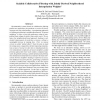Free Online Productivity Tools
i2Speak
i2Symbol
i2OCR
iTex2Img
iWeb2Print
iWeb2Shot
i2Type
iPdf2Split
iPdf2Merge
i2Bopomofo
i2Arabic
i2Style
i2Image
i2PDF
iLatex2Rtf
Sci2ools
106
click to vote
ICDM
2007
IEEE
2007
IEEE
Scalable Collaborative Filtering with Jointly Derived Neighborhood Interpolation Weights
Recommender systems based on collaborative filtering predict user preferences for products or services by learning past user-item relationships. A predominant approach to collaborative filtering is neighborhood based (“ -nearest neighbors”), where a user-item preference rating is interpolated from ratings of similar items and/or users. We enhance the neighborhood-based approach leading to substantial improvement of prediction accuracy, without a meaningful increase in running time. First, we remove certain so-called “global effects” from the data to make the ratings more comparable, thereby improving interpolation accuracy. Second, we show how to simultaneously derive interpolation weights for all nearest neighbors, unlike previous approaches where each weight is computed separately. By globally solving a suitable optimization problem, this simultaneous interpolation accounts for the many interactions between neighbors leading to improved accuracy. Our method is very fast in...
| Added | 03 Jun 2010 |
| Updated | 03 Jun 2010 |
| Type | Conference |
| Year | 2007 |
| Where | ICDM |
| Authors | Robert M. Bell, Yehuda Koren |
Comments (0)

